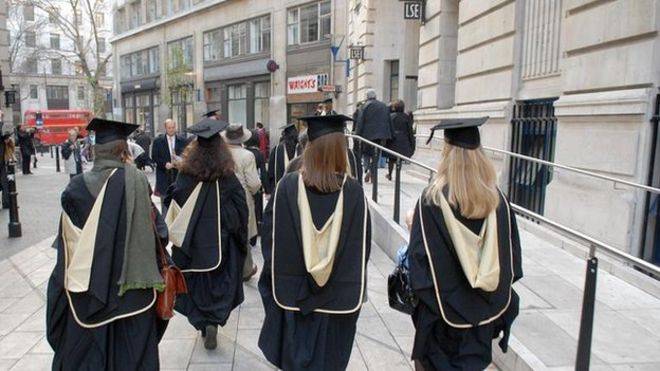- 5 hours ago
- Education & Family
- 376
-
(교육) 영국도 금수저 학생들이 흙수저 학생들보다 더 윤택한 삶 산다아름다운 인생/교육 2016. 4. 14. 01:41
출처: http://www.bbc.com/news/education-36024081
Wealthy students keep getting richer 금수저 학생들이 졸업후 흙수저 학생들보다 더 잘 산다

Students graduating from the London School of Economics have the highest average earnings 최고 연봉 받는 런던정경대 졸업생들 Graduates from wealthy families "earn significantly more" in their careers than less well-off counterparts, even if they study the same course at the same university, according to research. 최근 연구에 따르면, 금수저를 물고 태어난 졸업생들은 심지어 흙수저를 물고 태어난 졸업생과 같은 대학교에서 같은 과목을 공부한다해도, 나중에 전자는 후자보다 훨씬 더 돈을 많이 번다.
The study, based on 260,000 graduates in England, has examined the links between university and later income.
It shows big earning gaps between different courses and universities.
Jack Britton, of the Institute for Fiscal Studies, says it shows the persistence of "social immobility". (fiscal studies: 재정학, 세무학) 밝은 하늘: 지속적인 사회계층 이동의 불가능성은 영국뿐만 아니라 한국에도 해당됨.
The study, based on tax data, shows how the wealthiest students continue to have an advantage in their future employment, keeping them ahead of students from middle-class and low-income families.
 Thinkstock
ThinkstockMedical students have the highest earnings a decade after graduating 최고연봉 받는 의대졸업생들 Researchers from the Institute for Fiscal Studies, Cambridge University, the Institute of Education and Harvard University found graduates from the wealthiest 20% of families were typically earning 30% more than the remaining 80% of the graduate population, a decade after they left university.
Much of this advantage could be attributed to the university and course. For instance, medical students are likely to earn more than those who studied arts subjects.
But even taking this into account, students from wealthy families were earning 10% more than other graduates. 금수저 출신 학생들이 흙수저 출신 학생들보다 10%가량 돈을 더 벌어들임.
The research, based on incomes in 2012-13, showed graduates are likely to have higher earnings than those who did not go to university. 대졸자가 고졸자보다 더 돈을 많이 버는 거 같음
Graduates are also less likely to be out of work - and on average, male graduates have higher incomes than female. Although women with degrees have a greater earnings advantage over non-graduates. 대졸자는 비대졸자보다 덜 실업자일 가능성 커보임. 그리고 보통 남자 졸업생이 여자 졸업생보다 돈을 더 벌음. 여성 졸업자는 비졸업자보다 돈을 더 벌음.

Among graduates of Oxford, LSE and Cambridge, 10% are earning above £100,000 이 세개 대학 졸업생 중 10%는 연봉 100,000 파운드(한화 약 157,100,000원 해당) (현재 ₩1,571=£1) By their early 30s male graduates are typically being paid £8,000 per year more than non-graduates and female graduates are earning £9,000 per year more than their non-graduate counterparts. (밝은 하늘: 이 문장은 오류로 보임. 그 이유는 앞서 나온 바에 의하면, 남자 졸업생이 일반적으로 여자 졸업생보다 연봉이 높다고 나왔는데, 위 문장은 이와 상반되기 때문이다. 아마 글쓴이가 숫자를 특히 8과 9를 혼동하거나 잘못 쓴 것으로 보인다.)
Graduates of the London School of Economics had the highest pay.
This is linked to London's jobs market and reflects that economics graduates are among the highest earners.
Students with degrees from Oxford and Cambridge were also likely to have an advantage in earning power.
And London graduates, including universities such as Imperial College and King's College, were generally likely to have higher incomes. Incomes for male graduates from King's College London were higher than either Oxford or Cambridge.
The study found 10% of male graduates from the LSE, Oxford and Cambridge were earning more than £100,000 a decade after graduating.
For female graduates, the LSE was the only university where 10% of female graduates had this level of earnings.
The study also showed that male graduates from more than 20 unidentified universities were earning, on average, less than the non-graduate national average.
The report says this reflects the wide differences in regional earnings - with some local labour markets having low pay for graduates and non-graduates compared with an average pushed up by higher earnings in London.
The most lucrative courses in terms of future earnings were medicine, economics, engineering and law. (lucrative: 수익성 좋은) 현재 가장 전망 좋은 과거의 전공은 의학, 경제학, 공학, 법학.
A man who studied medicine was likely to be earning £21,000 per year more than a graduate in a creative arts subject.
"The research illustrates strongly that for most graduates, higher education leads to much better earnings than those earned by non-graduates, although students need to realise that their subject choice is important in determining how much of an earnings advantage they will have," said Anna Vignoles of the University of Cambridge.
Jack Britton, research economist at the IFS said the study shows how "the advantages of coming from a high-income family persist for graduates right into the labour market".
 Reuters
ReutersGraduates from London seem to benefit from higher earnings in the capital Pam Tatlow, chief executive of the Million+ group of new universities, said: "More than anything else these findings confirm that Britain remains a society in which some are born clutching a golden ticket that provides a passport to higher earnings regardless of where and what people study." (born clutching a golden ticket: 금수저를 물고 태어난, 황금티켓을 움켜쥐고 태어난. clutch: 움켜쥐다.)
Russell Group director general Wendy Piatt welcomed the evidence that a "university education provides an earnings premium for most graduates when compared with non-graduates".
Nick Hillman, director of the Higher Education Policy Institute, said the research added important "weight and colour to what we know about social mobility".
"Some people in the university sector have been uncomfortable about the research because it shows certain degrees lead to lower earnings.
"But there is no point opposing its publication. Evidence is the raw material of academia, so it is particularly unconvincing when people in universities argue new data should not be produced or should be ignored."
Universities Minister Jo Johnson said: "We have seen record application rates among students from disadvantaged backgrounds, but this latest analysis reveals the worrying gaps that still exist in graduate outcomes.
"We want to see this information used to improve the experience students are getting across the higher education sector."
'아름다운 인생 > 교육' 카테고리의 다른 글
(교육/동영상) Knowledge of the channel e_교육 시리즈_쓸데없는 공부 (0) 2016.05.14 (교육) 캠브리지 대학 옥스포드 대학 순위 하락 (0) 2016.05.05 (교육) 시사IN: 책에 아이들을 가둬서는 안 된다 (0) 2016.04.09 (교육/미국) 미국에서 왜 수학교육은 정치적으로 중요한 이슈인가? (0) 2016.03.14 (교육) Third Catholic teacher confesses to sexual abuse in Spain (0) 2016.03.09